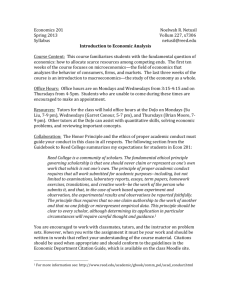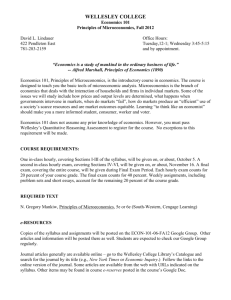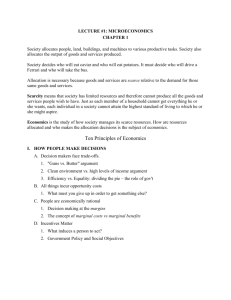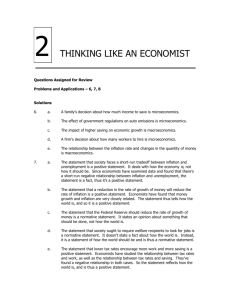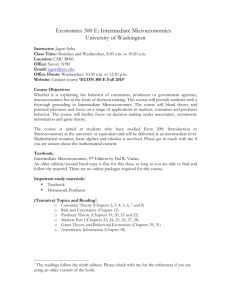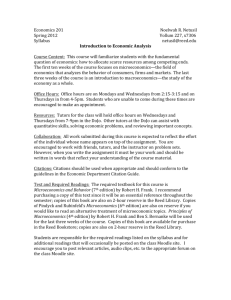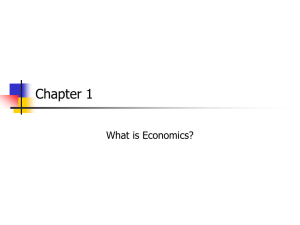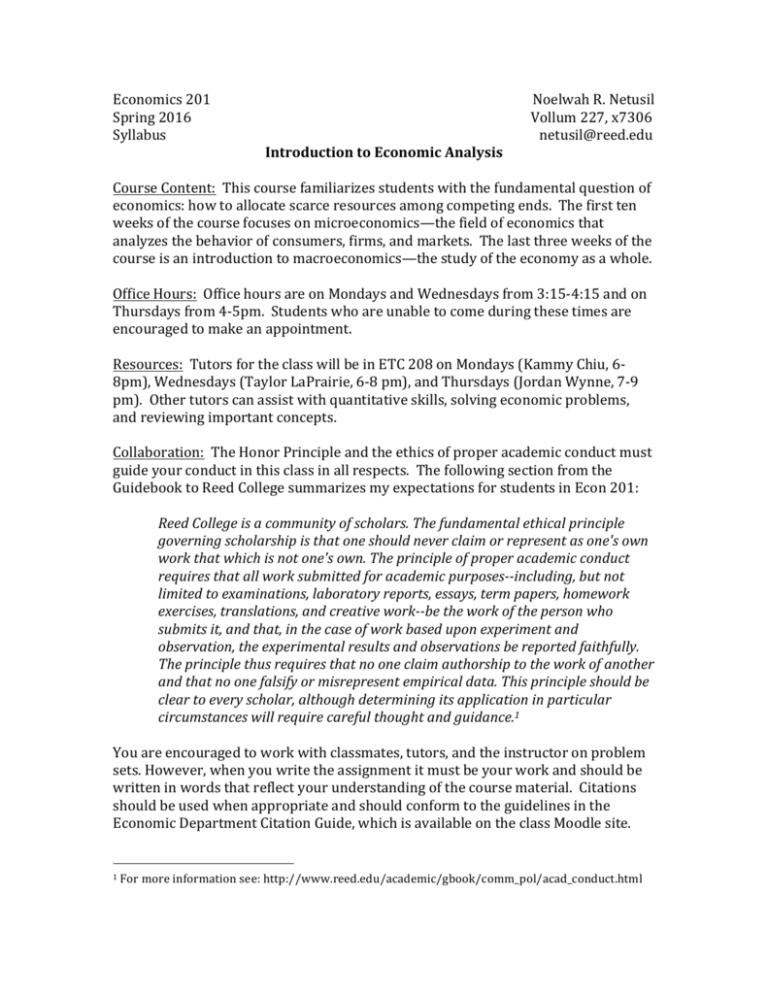
Economics201
Spring2016 Syllabus
NoelwahR.Netusil
Vollum227,x7306
netusil@reed.edu
IntroductiontoEconomicAnalysis
CourseContent:Thiscoursefamiliarizesstudentswiththefundamentalquestionof
economics:howtoallocatescarceresourcesamongcompetingends.Thefirstten
weeksofthecoursefocusesonmicroeconomics—thefieldofeconomicsthat
analyzesthebehaviorofconsumers,firms,andmarkets.Thelastthreeweeksofthe
courseisanintroductiontomacroeconomics—thestudyoftheeconomyasawhole.
OfficeHours:OfficehoursareonMondaysandWednesdaysfrom3:15-4:15andon
Thursdaysfrom4-5pm.Studentswhoareunabletocomeduringthesetimesare
encouragedtomakeanappointment.
Resources:TutorsfortheclasswillbeinETC208onMondays(KammyChiu,68pm),Wednesdays(TaylorLaPrairie,6-8pm),andThursdays(JordanWynne,7-9
pm).Othertutorscanassistwithquantitativeskills,solvingeconomicproblems,
andreviewingimportantconcepts.
Collaboration:TheHonorPrincipleandtheethicsofproperacademicconductmust
guideyourconductinthisclassinallrespects.Thefollowingsectionfromthe
GuidebooktoReedCollegesummarizesmyexpectationsforstudentsinEcon201:
ReedCollegeisacommunityofscholars.Thefundamentalethicalprinciple
governingscholarshipisthatoneshouldneverclaimorrepresentasone'sown
workthatwhichisnotone'sown.Theprincipleofproperacademicconduct
requiresthatallworksubmittedforacademicpurposes--including,butnot
limitedtoexaminations,laboratoryreports,essays,termpapers,homework
exercises,translations,andcreativework--betheworkofthepersonwho
submitsit,andthat,inthecaseofworkbaseduponexperimentand
observation,theexperimentalresultsandobservationsbereportedfaithfully.
Theprinciplethusrequiresthatnooneclaimauthorshiptotheworkofanother
andthatnoonefalsifyormisrepresentempiricaldata.Thisprincipleshouldbe
cleartoeveryscholar,althoughdeterminingitsapplicationinparticular
circumstanceswillrequirecarefulthoughtandguidance.1
Youareencouragedtoworkwithclassmates,tutors,andtheinstructoronproblem
sets.However,whenyouwritetheassignmentitmustbeyourworkandshouldbe
writteninwordsthatreflectyourunderstandingofthecoursematerial.Citations
shouldbeusedwhenappropriateandshouldconformtotheguidelinesinthe
EconomicDepartmentCitationGuide,whichisavailableontheclassMoodlesite.
1Formoreinformationsee:http://www.reed.edu/academic/gbook/comm_pol/acad_conduct.html
TextandRequiredReadings:Therequiredtextbookforthiscourseis
MicroeconomicsandBehavior(7thedition)byRobertH.Frank.Irecommend
purchasingacopyofthistextsinceitwillbeanessentialreferencethroughoutthe
semester;copiesofthisbookarealsoon2-hourreserveintheReedLibrary.Copies
ofPindyckandRubinfeld’sMicroeconomics(6thedition)arealsoonreserveifyou
wouldliketoreadanalternativetreatmentofmicroeconomictopics.Principlesof
Macroeconomics(6thedition)byN.GregoryMankiwwillbeusedforthelastthree
weeksofthecourse.CopiesofthisbookareavailableforpurchaseintheReed
Bookstoreandarealsoon2-hourreserveintheReedLibrary.
Studentsareresponsiblefortherequiredreadingslistedonthesyllabusandfor
additionalreadingsthatwilloccasionallybepostedontheclassMoodlesite.I
encourageyoutopostrelevantarticles,audioclips,etc.totheappropriateforumon
theclassMoodlesite.
ReserveMaterials:Thefollowingbooksareontwo-hourreserve
Feenstra,RobertC.andAlanM.Taylor.2008.InternationalTradeNewYork,NY:
WorthPublishers.
Frank,RobertH.2008.MicroeconomicsandBehavior(7thedition)Boston,MA:
McGraw-HillIrwin.
Mankiw,N.Gregory.2012.PrinciplesofMacroeconomics(6thedition)Mason,OH:
South-WesternCengageLearning.
Pindyck,RobertS.andDanielL.Rubinfeld.2005.Microeconomics(6thedition)Upper
SaddleRiver,NJ:PearsonPrenticeHall.
ImportantDates:
MidtermExaminations:February26andApril8
ComprehensiveFinalExam:Dateandtimetobeannouncedbythe
Registrar’sOffice
Therearefiverequiredproblemsetsforthecourse.Problemsetsaredueoneweek
aftertheyaredistributed.Hardcopiesofallassignmentsaredueatthestartofclass
withlateassignmentspenalized1lettergradeforeachdaypasttheduedate;
assignmentshandedinmorethan3daysaftertheduedatewillnotbeaccepted.
Pleasecontactmeassoonaspossibleifthereareextenuatingcircumstances
(illness,personalemergency)thatjustifyanextensionofaproblemsetdeadline.
ProblemSet
1
2
3
4
5
DateDistributed
Friday,February5
Friday,February12
Friday,March4
Friday,March18
Wednesday,April20
2
DateDue
Friday,February12
Friday,February19
Friday,March11
Friday,April1
Wednesday,April27
CourseOutlineandReadings2
I.
IntroductiontoMicroeconomics:January25
Frank,Chapter1
*Whaples,Robert.2006.DoEconomistsAgreeonAnything?Yes!TheEconomists’
Voice3(9)Article1.
*Backhouse,RogerE.andStevenG.Medema.2009.OntheDefinitionofEconomics
JournalofEconomicPerspectives23(1)221-233.
II.
Demand,SupplyandMarketEquilibrium:January27&29,February1
Frank,Chapter2andAppendix
Surowiecki,James.2002.FareGamesTheNewYorker(March18).
TheEconomist.2016.ElectionForecasting:Prediction2016(January2)
Kroetz,KailinandJamesN.Sanchirico.2015.TheCostsofCompetingGoalsin
FisheryManagementResources(September24)18-24.
III.
ConsumerBehaviorandDemand:February3,5,8,10&12
Frank,Chapters3,4&5
Glaeser,EdwardL.2005.ShouldtheGovernmentRebuildNewOrleans,OrJustGive
ResidentsChecks?TheEconomists’Voice2(4)Article4.
English,Ed.2011.TaxandNicotine.EconSouth(SecondQuarter):22-26.
*Waldfogel,Joel.1993.TheDeadweightLossofChristmasTheAmericanEconomic
Review83(5)1328-1336.
*Kagel,JohnH.,RaymondC.BattalioandLeonardGreen.1995.EconomicChoice
Theory:AnExperimentalAnalysisofAnimalBehavior.CambridgeUniversity
Press,Cambridge,UK.
*Leibensten,H.1950.Bandwagon,Snob,andVeblenEffectsintheTheoryof
Consumers'DemandTheQuarterlyJournalofEconomics64(2):183-207.
IV.
ApplicationsofConsumerTheory:February15&17
Frank,Chapters6&8
TheEconomist.2009.New-YearIrresolution(December30)55.
TheEconomist.2008.CarrotandStickK(February7)82-83.
*Akerlof,GeorgeAandRobertJ.Shiller.2009.AnimalSpirits:HowHuman
PsychologyDrivestheEconomy,andWhyitMattersforGlobalCapitalism.
Princeton,NJ:PrincetonUniversityPress.
*Kahneman,Daniel.2003.APsychologicalPerspectiveonEconomics.American
EconomicReview93(2):162-166.
Readingsmarkedwitha*areoptional.TheseareavailableinthestacksoftheReedLibraryor
througharticledatabases.
2
3
V.
LaborandCapitalMarkets:February19,22&24
Frank,Chapters14and15
Daly,MaryandLeilaBengali.2014.IsItStillWorthGoingtoCollege?FederalReserve
BankofSanFranciscoEconomicLetter(May5).
Neumark,David.2015.TheEffectsofMinimumWagesonEmploymentFederal
ReserveBankofSanFranciscoEconomicLetter(December21).
Neumark,David.2015.ReducingPovertyviaMinimumWages,AlternativesFederal
ReserveBankofSanFranciscoEconomicLetter(December28).
*Blau,FrancineD.andLawrenceM.Kahn.2007.TheGenderPayGapThe
Economists’Voice4(4)Article5.
*Blank,RebeccaM.2011.ChangingInequalityUniversityofCaliforniaPress,
Berkeley,California.
*Brummer,ChrisandDanielGorfine.2013.Crowdfunding:TheNextBigThingThe
MilkenInstituteReview(FirstQuarter)66-72.
*Goldin,Claudia.2015.HowtoAchieveGenderEquityinPayTheMilkenInstitute
Review(3rdquarter)24-33.
*Slemrod,JoelandJonM.Bakija.2008.TaxingOurselves:ACitizen'sGuidetothe
DebateOverTaxesMITPress,Cambridge,Massachusetts.
MidtermExamination#1:Friday,February26
VI.
ProductionandCost:February29,March2&4
Frank,Chapters9and10
Rich,Motoko.2010.MathofPublishingMeetstheE-BookTheNewYorkTimes
(March28).
TheEconomist.2012.FreeExchange:LandoftheCorporateGiants(November3).
VII. PerfectCompetition:March7&9
Frank,Chapter11
TheEconomist.2009.NewspapersandTechnology:NetworkEffects(December17).
TheEconomist.2016.RoomRentalsv.Hotels:Buffett'sRevenge(January9)
VIII. ImperfectCompetition:March11,14&16
Frank,Chapters12and13
TheEconomist.2009.EconomicsFocus:EPluribusTunum(October24)88.
* Schmalensee,Richard.1978.EntryDeterrenceintheReady-to-EatBreakfast
CerealIndustryTheBellJournalofEconomics9(2)305-327.
IX.
GeneralEquilibriumandEfficiency:March18
Frank,Chapter18W(focusonpages18W-1to18W-15).
4
X.
Externalities:March28
PindyckandRubenfeld,Microeconomics,Chapter18(pages641-665).
WilliamsIII,RobertonC.,DallasBurtraw,andRichardD.Morgenstern.2015.The
ImpactsofaUSCarbonTaxAcrossIncomeGroupsandStatesResources
(September24):25-29.
Stone,Chad.2015.DesigningRebatestoProtectLow-IncomeHouseholdsUndera
CarbonTaxResources(September24)31-35.
*Davis,LucasW.2008.TheEffectofDrivingRestrictionsonAirQualityinMexico
CityJournalofPoliticalEconomy116(1)38-81.
*Grainger,CorbettandCharlesKolstad.2010.WhoPaysaPriceonCarbon?
EnvironmentalandResourceEconomics46(3)359-396.
*Leape,Jonathan.2006.TheLondonCongestionChargeJournalofEconomic
Perspectives20(4)157-176.
* Sovacool,Benjamin.2008.RenewableEnergy:EconomicallySound,Politically
Difficult.TheElectricityJournal21(5):18-29.
XI.
PublicGoods:March30&April1
Frank,Chapter17(pages567-582)
Henrich,Joseph,RobertBoyd,SamuelBowles,ColinCamerer,ErnstFehr,Herbert
Gintis,andRichardMcElreath.2001.InSearchofHomoEconomicus:
BehavioralExperimentsin15Small-ScaleSocietiesAmericanEconomic
Review91(2)73-78.
XII. IncomeDistributionandPoverty:April4
Frank,Chapter17(pages582-591)
Bengali,LeilaandMaryDaly.2013.U.S.EconomicMobility:TheDreamandtheData
FederalReserveBankofSanFranciscoEconomicLetter(March4).
Dube,ArindrajitandEthanKaplan.2012.OccupyWallStreetandthePolitical
EconomyofInequality.TheEconomistsVoice(March)1-7.
*Alvaredo,Facundo,AnthonyB.Atkinson,ThomasPikettyandEmmanuelSaez.
2013.TheTop1PercentinInternationalandHistoricalPerspectiveJournal
ofEconomicPerspectives27(3)3-20.
*Blank,Rebecca.2006.WasWelfareReformSuccessful?TheEconomists'Voice3(4).
*Cragg,MichaelandRandGhayad.2015.GrowingApart:TheEvolutionofIncome
vs.WealthInequalityTheEconomists'Voice12(1)1-12.
XIII. InternationalTrade:April6
FeenstraandTaylor,InternationalTrade,Chapter1
Mankiw,PrinciplesofMacroeconomics,Chapter3
*Farrell,Diane.2006.U.S.Offshoring:SmallStepstoMakeitaWin-WinThe
Economists’Voice3(3).
5
MidtermExamination#2:Friday,April8
XIV. IntroductiontoMacroeconomics:April11
Mankiw,Chapters10and11
Stiglitz,JosephE.2009.GDPFetishismTheEconomists’Voice6(8)Article5.
Revkin,AndrewC.2005.ANewMeasureofWell-BeingFromaHappyLittle
KingdomTheNewYorkTimes(October4).
XV.
EconomicGrowth:April13
Mankiw,Chapter12
TheEconomist.2010.WorthaHillofSoyabeans(January7)
Cox,MichaelW.andRichardAlm.2008.ChinaandIndia:TwoPathstoEconomic
PowerFederalReserveBankofDallasEconomicLetter3(8).
TheEconomist.2012.GreenGrowth:Shoots,GreensandLeaves(June16):68-70.
*Komlos,John.2015.DisruptiveInnovation:TheDarkSideTheMilkenInstitute
Review(FirstQuarter)28-34.
*Looney,Robert.2013.ExpeditionaryEconomics:MakeEntrepreneurs,NotWarThe
MilkenInstituteReview(SecondQuarter)30-37.
*Rodrik,Dani.2014.WhyanAfricanGrowthMiracleisUnlikelyTheMilkenInstitute
Review(FourthQuarter)42-54.
*TheBrookingsInstitution.2013.FosteringGrowthThroughInnovation(January
15).
XVI. Unemployment:April15
Mankiw,Chapter15
Farber,HenryS.2012.TheCostofJobLossintheGreatRecession:HowBadHasIt
Been?Economists’Voice(January):1-5.
Martinez-Garcia,EnriqueandJanetKoech.2010.AHistoricalLookattheLabor
MarketDuringRecessionsEconomicLetter--InsightsfromtheFederalReserve
BankofDallas5(1).
XVI.Money,MonetaryPolicyandInflation:April18&20
Mankiw,Chapters16and17
Akerlof,George,WilliamDickens,andGeorgePerry.2000.WhyaLittleInflationis
Good.MilkenInstituteReview(4thquarter):12-18.
Williams,JohnC.2015.DancingDaysAreHereAgain:TheLongRoadBackto
MaximumEmploymentFederalReserveBankofSanFranciscoEconomic
Letter(December7).
* Radford,R.A.1945.TheEconomicOrganizationofaP.O.W.CampEconomica12
(48)189-201.
6
XVII. TheShortRun--EconomicFluctuations:April22
Mankiw,Chapter20
Bosworth,BarryP.2015.Opinion:LimitedGainsinLivingStandardsCausedbya
Supply-SideRecessionBrookingsInstitution(December).
Bernanke,Ben.2012.SomeReflectionsontheCrisisandthePolicyResponse.
SpeechdeliveredattheRussellSageFoundationandTheCenturyFoundation
Conferenceon"RethinkingFinance,"NewYork,NewYork(April13).
XVIII. MonetaryandFiscalPolicy:April25&27
Mankiw,Chapters21and22
TheEconomist.2012.FreeExchange:NoShortCuts.(October27)
Stiglitz,Joseph.2012.StimulatingtheEconomyinanEraofDeficitandDebt.The
Economists’Voice(March):1-6.
Bernanke,BenS.2013.ACenturyofU.S.CentralBanking:Goals,Frameworks,and
AccountabilityJournalofEconomicPerspectives27(4)3-16.
*TheEconomists'Voice.2012.WhatToDoAbouttheLongRunFederalBudget
Problems?(March).
*Krugman,Paul.1998.Baby-SittingtheEconomySlate(August14).
*Fair,Ray.1996.EconometricsandPresidentialElections.JournalofEconomic
Perspectives10(3):89-102.
XIX. ConcludingThoughts:April29
Mankiw,Chapter23
TheEconomist.2012.TheNextCrisis:SpongingBoomers(September29):75-76.
Krugman,Paul.2009.HowDidEconomistsGetItSoWrong?TheNewYorkTimes
(September2).
7

